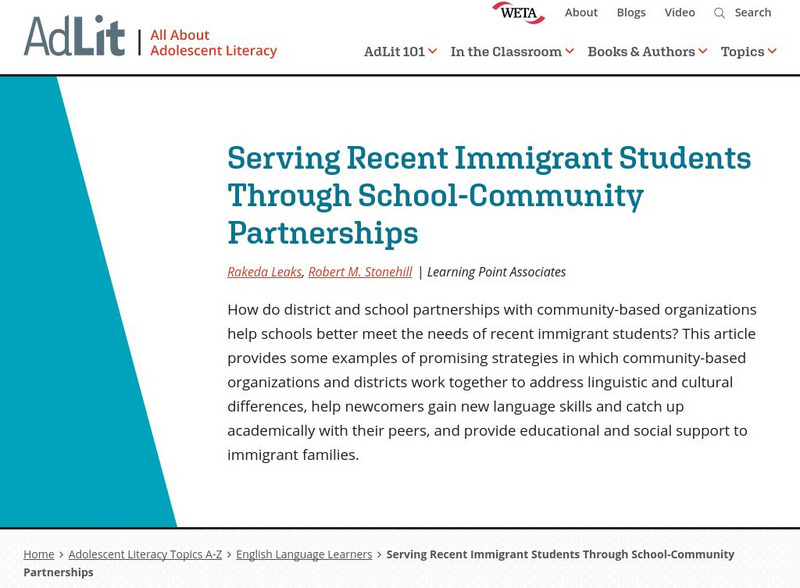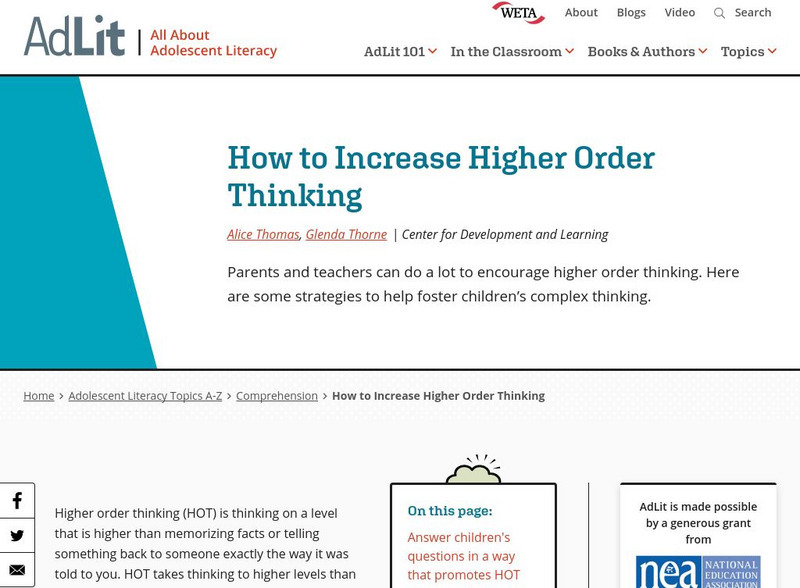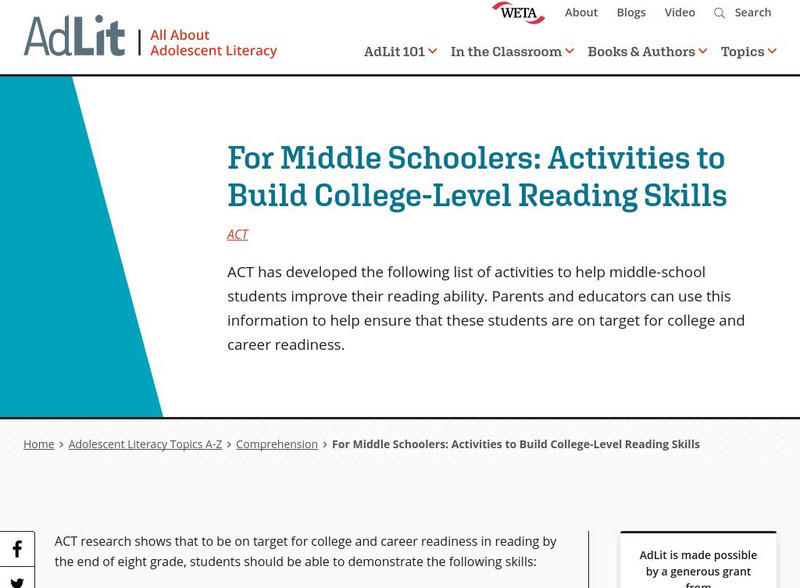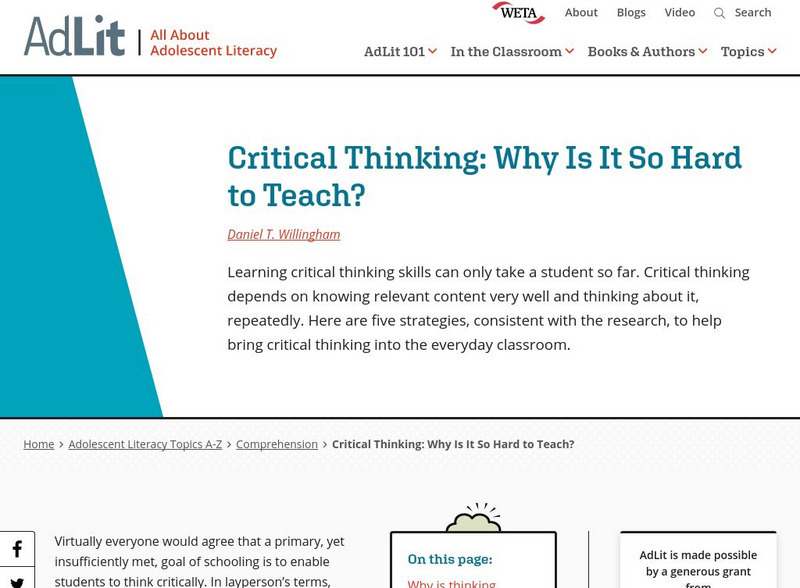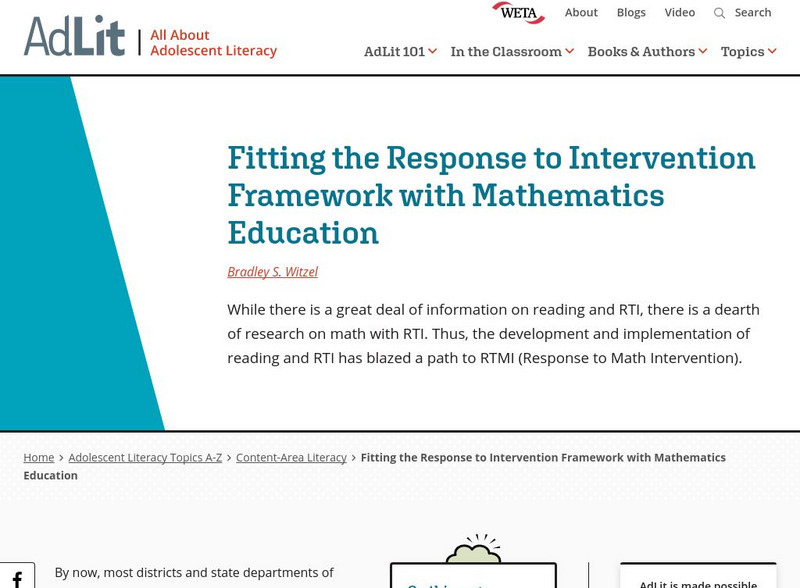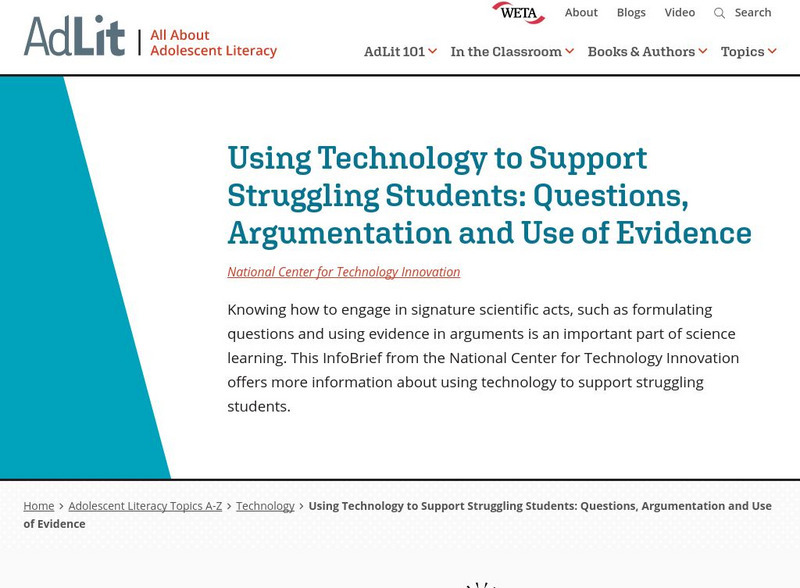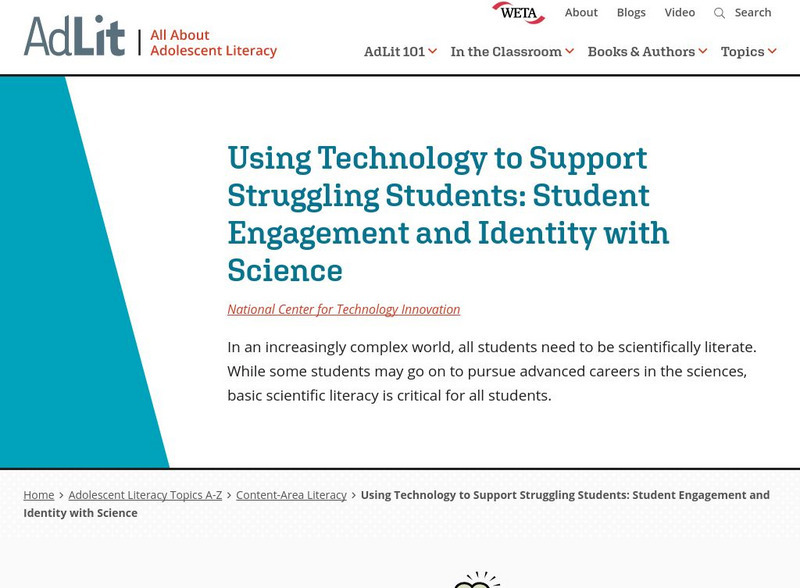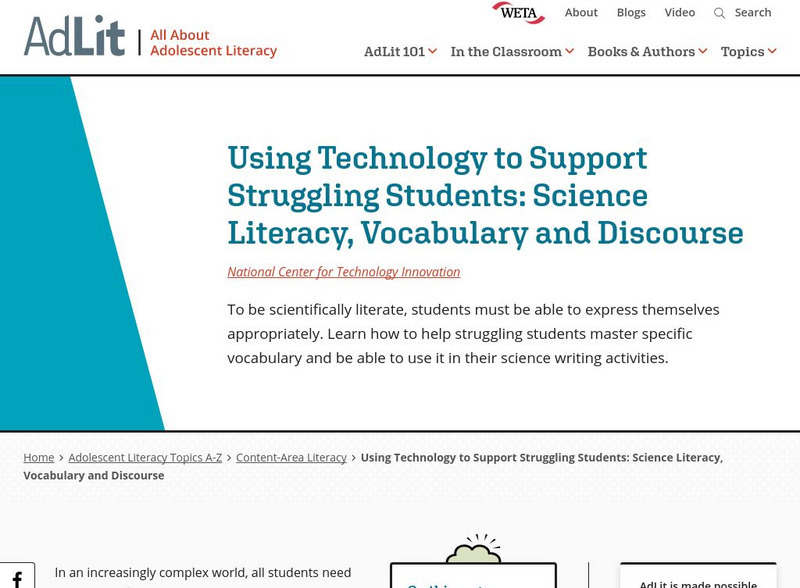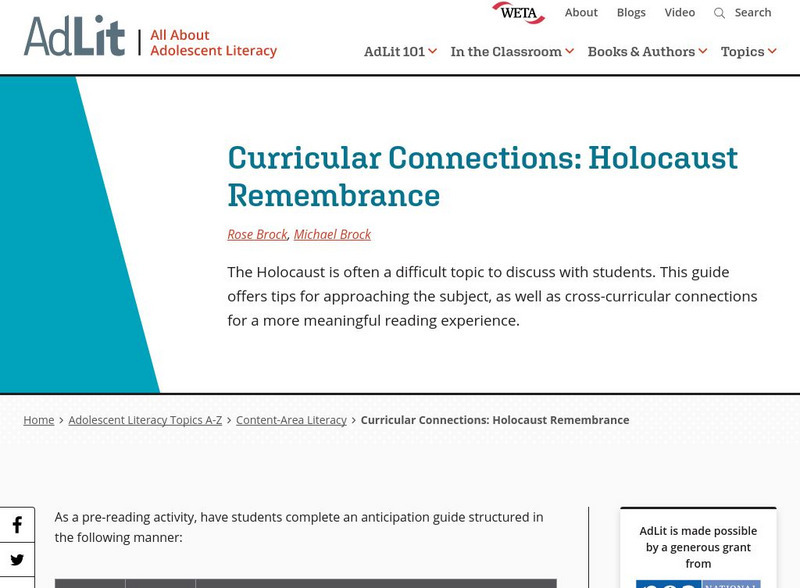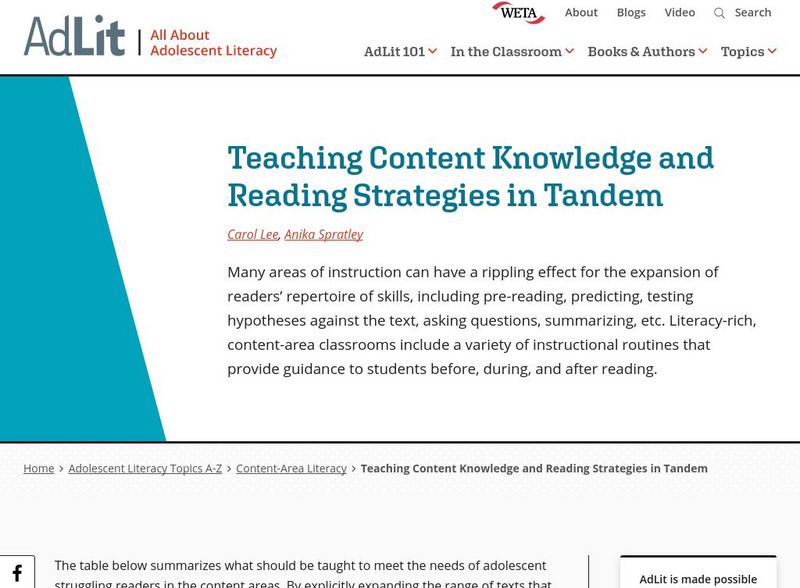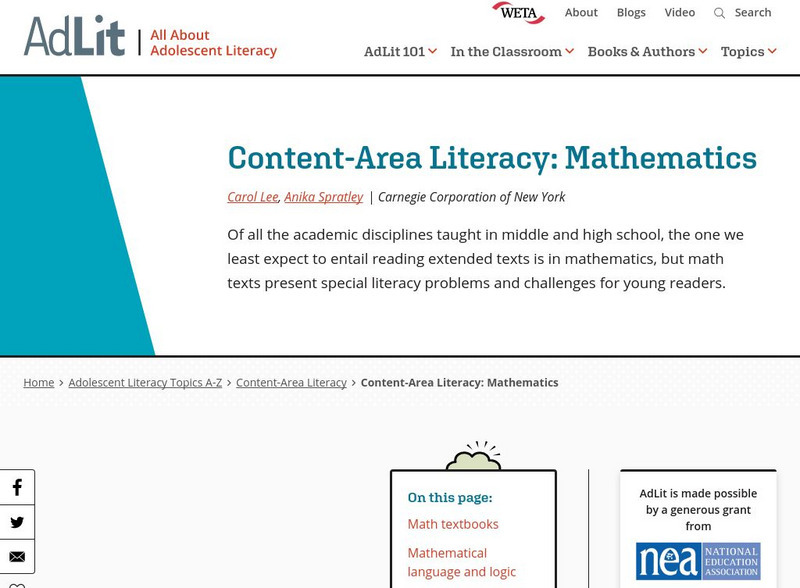AdLit
Ad lit.org: Serving Immigrant Students Through School Community Partnerships
How do district and school partnerships with community-based organizations help schools better meet the needs of recent immigrant students? This article provides some examples of promising strategies in which community-based...
AdLit
Ad lit.org: Organizations That Promote Adolescent Literacy
From lesson plans and classroom tools to free books and opportunities to publish students' work, nonprofit organizations have a lot to offer parents, teachers, and struggling readers themselves. Learn about some nonprofits with a...
AdLit
Ad lit.org: How to Increase Higher Order Thinking
Parents and teachers can do a lot to encourage higher order thinking. Here are some strategies to help foster children's complex thinking.
AdLit
Ad lit.org: Higher Order Thinking
As students grow older, they are asked by their teachers to do more and more with the information they have stored in their brains. These types of requests require accessing higher order thinking (HOT).
AdLit
Ad lit.org: Improve Performance on Reading Comprehension Tests
This article describes some of the thought processes that can help students perform well on standardized tests of reading comprehension. It includes two reading passages along with sample test questions that call on skills that eighth...
AdLit
Ad lit.org: For Middle Schoolers: Activities to Build College Level Reading Skills
ACT has developed this list of activities to help middle-school students improve their reading ability. Parents and educators can use this information to help ensure that these students are on target for college and career readiness.
AdLit
Ad lit.org: Key Literacy Component: Text Comprehension
Text comprehension allows readers to extract or construct meaning from the written word. Students who misread words or misinterpret their meanings are at a disadvantage. Proper instruction can boost students' skills in this key area.
AdLit
Ad lit.org: A Theory of Adolescent Reading: A Simple View of a Complex Process
How do adolescents move from reading words to applying knowledge learned from a text? See the adolescent reading model and the Strategic Intervention Model (SIM) clearly illustrated.
AdLit
Ad lit.org: Critical Thinking: Why Is It So Hard to Teach?
Learning critical thinking skills can only take a student so far. Critical thinking depends on knowing relevant content very well and thinking about it, repeatedly. Here are five strategies, consistent with the research, to help bring...
AdLit
Ad lit.org: What Do Reading Comprehension Tests Measure? Knowledge.
The federal No Child Left Behind law requires more testing of students, and has spurred some frantic and ineffectual test preparation in many schools, says the author, E. D. Hirsch, Jr. Reading tests must use unpredictable texts to be...
AdLit
Ad lit.org: What Works in Comprehension Instruction
The National Reading Panel identified three predominant elements to support the development reading comprehension skills: vocabulary instruction, active reading, and teacher preparation to deliver strategy instruction. L .9-10.3...
AdLit
Ad lit.org: Develop Fluency Using Content Based Texts
Fluency is the missing piece of the reading puzzle for many older students. They can decode, but they cannot do it automatically and accurately enough to comprehend text. Here are some fluency-building activities to complement content...
AdLit
Ad lit.org: Analytical Writing in the Content Areas
Because writing is thinking, the organization of students' writing reflects both the structure of their thinking and the depth of their understanding. Students should be writing in all their classes, explaining what they know and how...
AdLit
Ad lit.org: Fitting Response to Intervention Framework to Mathematics Education
While there is a great deal of information on reading and RTI, there is a dearth of research on math with RTI. Thus, the development and implementation of reading and RTI has blazed a path to RTMI (Response to Math Intervention).
AdLit
Ad lit.org: Using Technology to Support Struggling Students
Knowing how to engage in signature scientific acts, such as formulating questions and using evidence in arguments is an important part of science learning. This InfoBrief from the National Center for Technology Innovation offers more...
AdLit
Ad lit.org: Using Technology to Support Struggling Students
Science learning often involves creating abstract representations and models of processes that we are unable to observe with the naked eye. Learn more about visualizing, representing, and modeling to aid struggling learners.
AdLit
Ad lit.org: Using Technology to Support Struggling Students
In an increasingly complex world, all students need to be scientifically literate. While some students may go on to pursue advanced careers in the sciences, basic scientific literacy is critical for all students.
AdLit
Ad lit.org: Using Technology to Support Struggling Students: Vocabulary
To be scientifically literate, students must be able to express themselves appropriately. Learn how to help struggling students master specific vocabulary and be able to use it in their science writing activities.
AdLit
Ad lit.org: Why Teach the Holocaust?
Teachers often find the Holocaust to be an overwhelming subject to approach with their students. While the Holocaust offers important lessons to today's students, it can be a difficult to find the appropriate amount of information to...
AdLit
Ad lit.org: Curricular Connections: Holocaust Remembrance
The Holocaust is often a difficult topic to discuss with students. This guide offers tips for approaching the subject, as well as cross-curricular connections for a more meaningful reading experience.
AdLit
Ad lit.org: Teaching Content Knowledge and Reading Strategies in Tandem
Many areas of instruction can have a rippling effect for the expansion of readers' repertoire of skills, including pre-reading, predicting, testing hypotheses against the text, asking questions, summarizing, etc. Literacy-rich,...
AdLit
Ad lit.org: Content Area Literacy: Mathematics
Of all the academic disciplines taught in middle and high school, the one we least expect to entail reading extended texts is in mathematics, but math texts present special literacy problems and challenges for young readers.
AdLit
Ad lit.org: Content Area Literacy: History
The ability to read historical documents including contemporary explications about societal, economic and political issues provides a direct link to literacy as preparation for citizenship. As in the other disciplines, schools are unique...
AdLit
Ad lit.org: Content Area Literacy: Science
The demands of comprehending scientific text are discipline specific and are best learned by supporting students in learning how to read a wide range of scientific genres. Besides text structures emphasizing cause and effect, sequencing...


